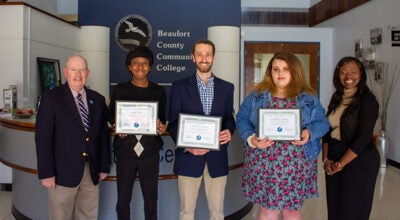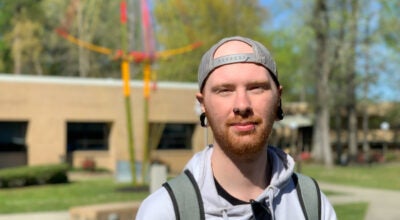Students learn Basic Skills Plus at BCCC
Published 11:21 pm Wednesday, August 8, 2012

Members of the first Basic Skills Plus class and their clinical instructor are (front row from left) clinical instructor Anne Davenport, Steffie Peterson, Donna Vann and Brandy Frazier; (back row) Jermaine Moore, Cathleen Shockley, Eurah Whitfield and Aushia Thomas. (Submitted Photo/Beaufort County Community College)
It was just a few months ago that Eurah Whitfield, a life-long resident of Belhaven, confessed to herself that she needed a change — and needed it to happen fast.
Whitfield had dropped out of school in the eighth grade to go to work in one of the crab houses in Belhaven. For over eight years, she had tried to earn her General Educational Development, or GED, through Beaufort County Community College, but family illness and other obstacles had prevented her from reaching her goal.
Her job caring for an elderly Belhaven resident had ended and Whitfield, who had begun her high school equivalency studies once again, was frustrated with her lack of progress.
“I told myself, ‘I’m sick of the life I’m living’,” she said. “I was sick of not accomplishing anything so I asked God to open a door for me.”
That door opened when Whitfield’s GED instructor, Phyllis Brimmage, told her about a new program being started at BCCC that would enable Whitfield and other students to obtain their GEDs at the same time that they studied for certification as nurse aides.
“She actually signed me up without telling me and I’m glad she did,” Whitfield said.
So in February, Whitfield enrolled in the program, known as Basic Skills Plus, which college officials hope will be successful in providing students like her with the skills they need to enter the work force.
This month, she and six other students completed their studies and are preparing to take the Certified Nursing Aide I licensing examination and enter the workforce.
“You want to see yourself accomplish things that people can be proud of you for doing,” Whitfield said. “And I’m proud of myself for doing this.”
By combining high school equivalency studies with studies related to a specific career, Basic Skills Plus gives its graduates specific job-related skills that will allow them to immediately enter the work force rather than having to wait for job-specific classes after they have completed their high school equivalency work, according to Laurie Weston, BCCC’s Basic Skills coordinator.
The program works by providing employment skills, job-specific occupational and technical skills and developmental education, if needed, to students enrolled concurrently in a GED program.
“We are very proud of these students. They have persevered through many hours of class work, lab work and on-site training,” Weston said. “They now have the foundation and the skills to move ahead to achieve their career goals and upon completion of their exams, will have the credentials to move on to more advanced studies, if they wish.”
Instructor Anne Davenport, who has overseen some of the on-site training for the class, said she has seen the students gain confidence in their work over the course of their studies.
“They have just blossomed,” she said.
Community college Basic Skills programs statewide have traditionally been popular with adult students who did not finish high school or are not fluent in English. In 2011, 138,636 North Carolinians were enrolled in adult basic education, English as a Second Language, adult high school and GED programs.
But there was a growing concern among community college officials about the significant number of students who do not progress from Basic Skills programs into meaningful education and job-training programs that help these students get a good job.
Statewide, about 50 percent of students who complete Basic Skills programs like the GED do not go on for additional training.
“A GED is not enough anymore,” Weston said. “This is an economy where employers and businesses are looking for trained and skilled workers.”
Jermaine Moore, who was also part of the first Basic Skills Plus class, agreed with Weston.
“You can’t make it without a GED or high school diploma,” he said.
Moore, a native of Beaufort County, became discouraged in high school and dropped out before earning his high school diploma. He worked in a series of jobs – most recently in disaster relief for the Salvation Army and in the water well and irrigation business – before deciding to return to school to continue his studies.
Working with the Region Q Workforce Development Board, BCCC’s Division of Continuing Education identified the CNA I program as the first career pathway for the Basic Skills Plus program. Weston and Sue Gurley, coordinator of the college’s Nurse Aide programs, developed the schedule and curriculum for the new program. Students in the program attended school two days a week, from 2 to 9:30 p.m., working on their GED studies in the afternoon and CNA I classes that same night.
Moore said the course work and the class schedule were sometimes difficult, given his work schedule, but the satisfaction of completing the program is worth it.
Moore said his family, particularly his 12-year-old son, is proud of what he has accomplished.
“My son keeps saying, ‘Dad’s going to be a nurse’,” Moore said.
Classes began earlier this summer for the second Basic Skills Plus program at BCCC. Students in that program are pursuing their GEDs and studying for certification as pharmacy technicians.
Weston said pharmacy and nursing were chosen because they are growing fields in Beaufort County. Plans are in the works to include welding and mechanical courses for the same reasons.
Course fees were waived for people in the program. Students were responsible for books and testing fees.
For more information about Basic Skills Plus programs offered at BCCC, interested persons should contact Laurie Weston at 252-940-6322 or Penelope Radcliffe at 252-940-6325 in BCCC’s Division of Continuing Education.




